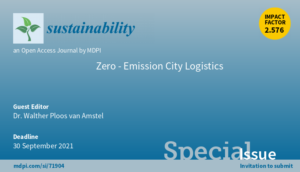To achieve the transition from diesel to zero-emission city logistics companies should prepare smartly on five levels. These levels require new scientific insights. Therefore Sustainability is preparing a special edition on zero-emission city logistics. Guest editor is prof. dr. Walther Ploos van Amstel.
Larger, but especially smaller, independent SME’s are looking forward to this transition. How do you arrange for affordable and reliable zero-emission city logistics, while the OEM-supply of vehicles is not even available yet? Their business operations must change to become EV-ready.
Research on smart vehicles
The first question is what is the right vehicle? The usual straight rebuy trade-in of the diesel delivery van for an electric delivery van is not smart. Consider the use of light electric vehicles, such as cargo bikes. There are already successful examples of innovative vehicles for parcel delivery, catering supplies, service logistics, and even construction logistics. And, what will be the impact of autonomous vehicles?
Research on smart driving
With a short driving range and the necessary charging time, better, dynamic planning is required. How will VRP and TMS change? The driving style and route choice determine how large the range is in practice. The new electric battery vehicles have onboard computers that monitor vehicle performance, the status of the journey, the battery, and the driving style of the driver. Together with up-to-date traffic information, robust planning can be made for the reliable use of the electric vehicle.
The driver plays a major role in fuel consumption. How can we encourage drivers to drive smartly? Many transport companies already involve their drivers with gamification in smarter driving.
Research on smart charging
Local governments must facilitate a smart charging infrastructure. By far, most light commercial vans are parked at night at the home of the florist, builder, or engineer. Trucks are charged at central distribution hubs. Are there enough charging stations there? Is there enough energy available? If the delivery van or truck is in the city, can the driver then recharge at a shopping center or office location? Is there a charging-area for the construction vans at the construction site? How does a driver find the way to the next available charging point?
For business parks where many vehicles must (re)charge, a vision is needed on smart energy generation and distribution, vehicle-to-building-to-grid. Over time, energy-intensive companies must receive separate attention in spatial planning. The availability of electricity becomes a selection criterion for the selection of hubs.
In addition to investments in charging infrastructure, investments are also required in smart charging. How can you distribute charging during the day for peak shaving? For providers of zero-emission mobility, there are opportunities here to offer new energy services.
Research on smart buying
Electricity is all but free. Diesel is for sale at every gas station for the same price per liter, creating a level playing field. This is different for electricity. The prices at the charging pole vary and are not transparent, especially for fast charging. Then the electricity might be more expensive than diesel. Fleet managers must smartly buy energy services (as part of the vehicle as a service offering).
Research on smart governance
On the roadmap towards 100 percent zero-emissions city logistics, the local government plays an important role in intelligent access and traffic management; who may or may not enter the city? Privileges can help companies take the first step to zero-emission vehicles with exemptions from window times, use of bus lanes, and access to zero-emission loading and unloading areas. Innovative traffic management systems can support digital enforcement. Public–private partnerships are needed to enable the transition from diesel to electric city logistics.
Manuscript Submission Information
Manuscripts should be submitted online at www.mdpi.com by registering and logging in to this website. Once you are registered, click here to go to the submission form. Manuscripts can be submitted until the deadline. All papers will be peer-reviewed. Accepted papers will be published continuously in the journal (as soon as accepted) and will be listed together on the special issue website. Research articles, review articles as well as short communications are invited. For planned papers, a title and short abstract (about 100 words) can be sent to the Editorial Office for announcement on this website.
Submitted manuscripts should not have been published previously, nor be under consideration for publication elsewhere (except conference proceedings papers). All manuscripts are thoroughly refereed through a single-blind peer-review process. A guide for authors and other relevant information for submission of manuscripts is available on the Instructions for Authors page.
Sustainability is an international peer-reviewed open access semimonthly journal published by MDPI.
Please visit the Instructions for Authors page before submitting a manuscript. The Article Processing Charge (APC) for publication in this open access journal is 1900 CHF (Swiss Francs). Submitted papers should be well formatted and use good English. Authors may use MDPI’s English editing service prior to publication or during author revisions.


Compliments for this publication. However I would like to state that logistics handling equipment and the most efficient handling units for delivery (starting at the first miles) together with the most efficient supply chain processes are key to make City Logistics a succes as well. Our research show cases that could have up to 50% more efficient City Logistics just by using different logistics equipment and totes/handling units choices.